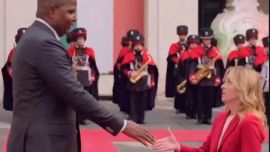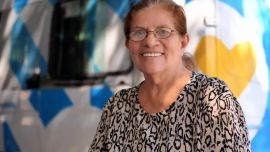Argentina’s 2021 electoral season got officially underway this weekend as the nation’s political parties finalised their line-ups for the upcoming PASO primaries.
Racing against the clock, leaders from both of the country’s main coalitions were locked in arduous negotiations that went right up to the Saturday midnight deadline, with lists in the provinces of Santa Fe and Córdoba agreed just before the cut-off. Slates for two key districts – Buenos Aires City and Province – were finalised late afternoon.
When the dust settled, the ruling Frente de Todos coalition opted for Peronist unity where possible, presenting single lists in most regions, with the opposition Juntos por el Cambio coalition lining up competing lists in key battlegrounds.
The PASO primaries, scheduled for September 12, will define the candidates for Argentina’s midterms in November 14, elections in which almost half the lower house Chamber of Deputies (127 of 257 seats) is up for renewal, with a third of the Senate (24 of 72 seats) also up for grabs.
The results will play a key part in defining Argentina’s political future, with the balance of power at stake in both houses of Congress, in turn impacting the government’s ability to pass legislation.
Battlegrounds
Underlining unity within the ruling coalition, Frente de Todos unveiled its candidates for the key battleground region of Buenos Aires Province during an event in Escobar, headed by President Alberto Fernández and Vice-President Cristina Fernández de Kirchner.
With Peronist heavyweights including Lower House Speaker Sergio Massa and Buenos Aires Province Governor Axel Kicillof in attendance, officials confirmed that the head of the Federal Council for Social Policy, Victoria Tolosa Paz, and provincial Health Minister Daniel Gollan would top the party’s ticket in what local analysts dub “the mother of all battles.” Other notable names on the slate include union leader Hugo Yasky and sitting deputy Leopoldo Moreau.
In total, 12 parties or coalitions will present candidates in Buenos Aires Province, the nation’s most-populous region, where 35 seats are up for grabs.
Most eyes will be on the main opposition coalition, renamed Juntos Podemos Mas in the district, where two lists will face-off: one dominated by PRO and topped by former Buenos Aires City Deputy Mayor Diego Santilli and national deputy Graciela Ocaña; and a second UCR-led list headed by neuroscientist Facundo Manes, making his political debut.
The other contested list comes from the Frente de Izquierda y de los Trabajadores-Unidad (FIT-U) coalition, which is presenting two lists topped by ex-lawmaker Nicolás del Caño (of the Partido de los Trabajadores Socialista, PTS) and Alejandro Bodart (for the Movimiento Socialista de los Trabajadores, MST).
Others who signed up for the PASO include the Vamos con Vos front led by Peronist ex-transport minister Florencio Randazzo, economist José Luis Espert’s Avanza Libertad, and Nuevo MAS’ Manuela Castañeira.
Competition
Argentina’s main opposition coalition will also use the PASOs to decide its candidates for the midterms in Buenos Aires City, with three lists in competition under the Juntos por el Cambio banner.
The heavy favourite will be ex-Buenos Aires Province governor María Eugenia Vidal, who has switched to the federal capital with the blessing of City Mayor Horacio Rodríguez Larreta to head a list of five that includes economist Martín Tetaz. The main challenger to that ticket will be ex-economy and defence minister Ricardo López Murphy, who was a late confirmation at the top of the rival ‘Adelante Ciudad’ Republicanos Unidos slate. A third Radical list has also joined the opposition face-off, headed by former health minister Adolfo Rubinstein.
Again sticking to a single list, Frente de Todos has opted to put up a slate in the City topped by presidential advisor Leandro Santoro, who will be accompanied by Gisela Marziotta, incumbent Carlos Heller, Lorena Pokoik and Matías Tombolini.
Left-wingers FIT-U will also put up two lists, one headed by current lawmaker Myriam Bregman and another topped by ex-presidential hopeful Celeste Fierro.
A total of 13 seats in the lower house are up for grabs in the capital, with another nine lists submitted. The most notable is La Libertad Avanza, led by high-profile economist Javier Milei.
Santa Fe
In the majority of Argentina’s other provinces and districts, negotiations between Frente de Todos and its allies ended in the presentations of single lists.
There were some notable exceptions though, for one in Santa Fe, where Defence Minister Agustín Rossi and former governor Alejandra Rodenas will face off against provincial senator Marcelo Lewandowski and national senator María de los Ángeles Sacnun for one of three Senate seats.
There will also be a head-to-head to decide the ruling front’s candidates for national deputy in Santa Fe, with leader of the Evita Movement Eduardo Toniolli at the top of Rossi’s list and national senator Roberto Mirabella topping Lewandovski’s.
Juntos por el Cambio also found it hard to reach a consensus, with four separate lists in competition under the opposition’s banner. Former Santa Fe City mayor José Corral is among those running for senator, facing challenges from PRO provincial deputy Federico Angelini, journalist Carolina Losada and provincial security ex-minister Maximiliano Pullaro. Among those competing for national deputy are incumbent Luciano Laspina, Rosario ex-councillor Rodrigo López Molina, ex-Santa Fe City mayor Mario Barletta and provincial deputy Gabriel Chumpitaz.
Left-wingers FIT-U and the Frente Amplio Progresista (FAP) will use the PASOs to finalise candidates, both putting up two slates in the region.
A total of nine seats in the Chamber of Deputies and three senators are up for grabs in November in Santa Fe Province.
Córdoba
In Córdoba, where nine deputies and three senators will be elected in November, eight confirmed lists were submitted for the PASOs.
Frente de Todos has nominated Senator Carlos Caserio and national deputy Gabriela Estévez for the upper house, with public works secretary Martín Gill and local Peronist leader Olga Riutort running for deputy.
Juntos por el Cambio will be presenting four lists, with national deputies Mario Negri, Luis Juez, Grisela Baldata joined by Javier Bee Sellares joining the race for a Senate seat. Among those running for deputy are former tourism minister Gustavo Santos, ex-ARSAT chief Rodrigo de Loredo, provincial lawmaker Dante Rossi and Civic Coalition ex-councillor Laura Sesma.
In what analysts have dubbed the ‘third way’ list, the ‘Hacemos por Córdoba’ (HxC) alliance – led by Governor Juan Schiaretti and backed by the Justicialist Party (PJ) – is putting up national deputy Alejandra Vigo (Schiaretti’s wife), for the Senate, seconded by provincial minister Eduardo Accastello. Natalia de la Sota, daughter of the late ex-governor José Manuel de la Sota, heads the list for deputies, joined by Santa Fe mayor Ignacio García Aresca.
Coalitions Unión Popular Federal and FIT-U will put up five and three slates respectively.
Closely watched
Another closely watched race will be Mendoza Province, where former governor Alfredo Cornejo – an influential voice in the opposition coalition – is running for the Senate, with Senator Julio Cobos in turn running for deputy on the same ‘Cambia Mendoza’ front. A rival list, which includes winemaker Rodolfo Vargas Arizu and provincial deputy Josefina Canale, will challenge.
Anabel Fernández Sagasti – a close ally of Vice-President Cristina Fernández de Kirchner – heads the Frente de Todos ticket in the province, running for senator, with Peronist leader Adolfo Bermejo going for deputy.
























Comments